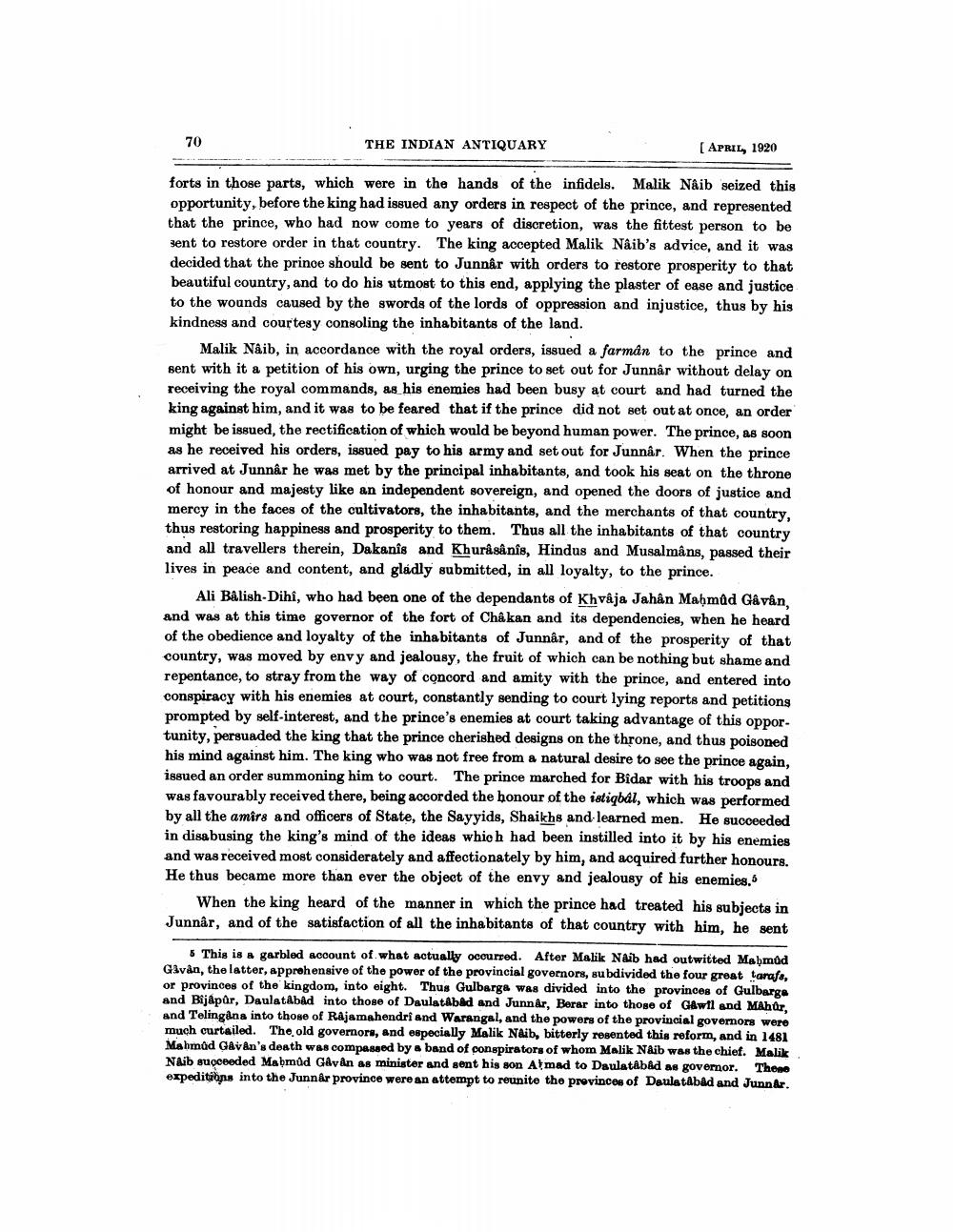________________
70
THE INDIAN ANTIQUARY
APRIL, 1920
forts in those parts, which were in the hands of the infidels. Malik Naib seized this opportunity, before the king had issued any orders in respect of the prince, and represented that the prince, who had now come to years of discretion, was the fittest person to be sent to restore order in that country. The king accepted Malik Naib's advice, and it was decided that the prinoe should be sent to Junnar with orders to restore prosperity to that beautiful country, and to do his utmost to this end, applying the plaster of ease and justice to the wounds caused by the swords of the lords of oppression and injustice, thus by his kindness and courtesy consoling the inhabitants of the land.
Malik Naib, in accordance with the royal orders, issued a farmán to the prince and sent with it a petition of his own, urging the prince to get out for Junnar without delay on receiving the royal commands, as his enemies had been busy at court and had turned the king against him, and it was to be feared that if the prince did not set out at once, an order might be issued, the rectification of which would be beyond human power. The prince, as soon as he received his orders, issued pay to his army and set out for Junnar. When the prince arrived at Junnar he was met by the principal inhabitants, and took his seat on the throne of honour and majesty like an independent sovereign, and opened the doors of justice and mercy in the faces of the cultivators, the inhabitants, and the merchants of that country, thus restoring happiness and prosperity to them. Thus all the inhabitants of that country and all travellers therein, Dakanis and Khurasanis, Hindus and Musalmâns, passed their lives in peace and content, and gladly submitted, in all loyalty, to the prince.
Ali Balish-Dihs, who had been one of the dependants of Khvâja Jahan Mahmud Gâvân, and was at this time governor of the fort of Chåkan and its dependencies, when he heard of the obedience and loyalty of the inhabitants of Junnar, and of the prosperity of that country, was moved by envy and jealousy, the fruit of which can be nothing but shame and repentance, to stray from the way of concord and amity with the prince, and entered into conspiracy with his enemies at court, constantly sending to court lying reports and petitions prompted by self-interest, and the prince's enemies at court taking advantage of this opportunity, persuaded the king that the prince cherished designs on the throne, and thus poisoned his mind against him. The king who was not free from a natural desire to see the prince again, issued an order summoning him to court. The prince marched for Bidar with his troops and was favourably received there, being accorded the honour of the istiqbal, which was performed by all the amirs and officers of State, the Sayyids, Shaikhs and learned men. He succeeded in disabusing the king's mind of the ideas which had been instilled into it by his enemies and was received most considerately and affectionately by him, and acquired further honours. He thus became more than ever the object of the envy and jealousy of his enemies.
When the king heard of the manner in which the prince had treated his subjects in Junnar, and of the satisfaction of all the inhabitants of that country with him, he sent
5 This is a garbled account of what actually occurred. After Malik Naib had outwitted Mahmud Gåvån, the latter, apprehensive of the power of the provincial governors, subdivided the four great tarafs, or provinces of the kingdom, into eight. Thus Gulbarga was divided into the provinces of Gulbarge and Bijapur, DaulatAbad into those of DaulatAbad and Junnar, Berar into those of Gawil and Mahar, and Telingana into those of Rajamahendri and Warangal, and the powers of the provincial governors were much curtailed. The old governors, and especially Malik Naib, bitterly resented this reform, and in 1481 Mahmod Gavan's death was compassed by a band of conspirators of whom Malik Naib was the chief. Malik Naib suoceeded Mabmůd Gåvån as minister and sent his son Almad to DaulatAbAd as governor. Then expeditions into the Junnar province were an attempt to reunite the provinces of Daulat Abad and Junnar.




